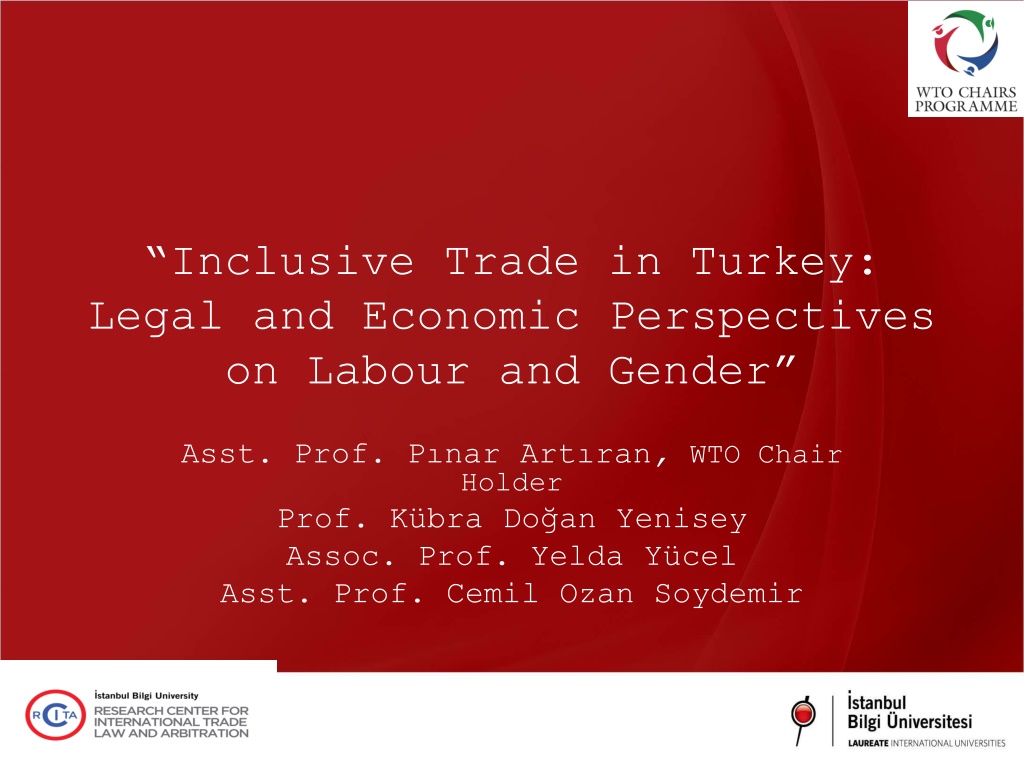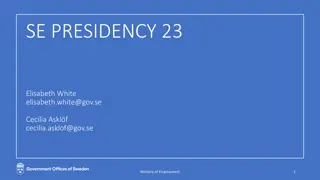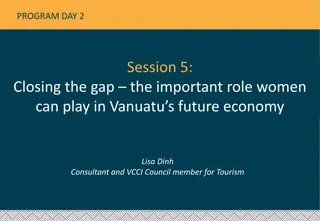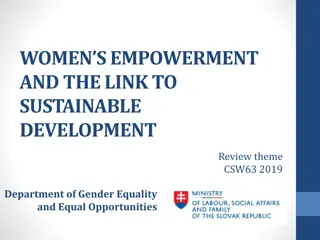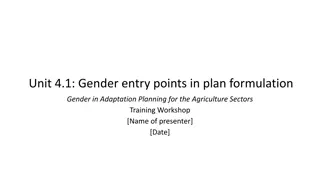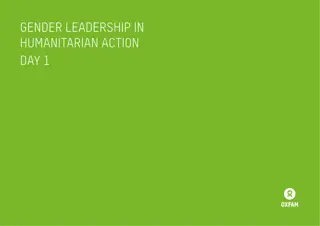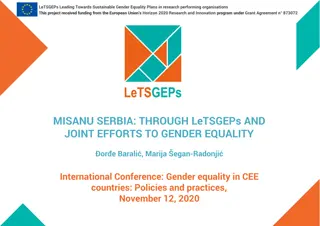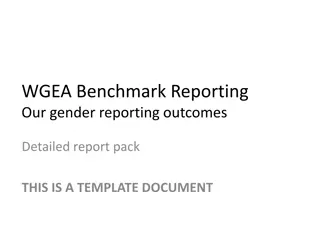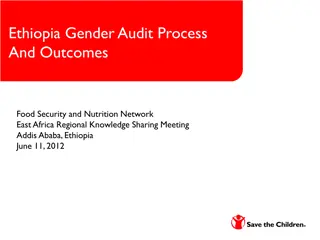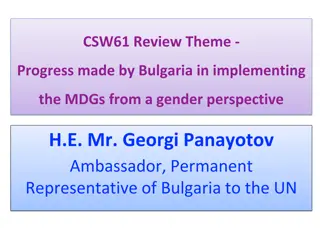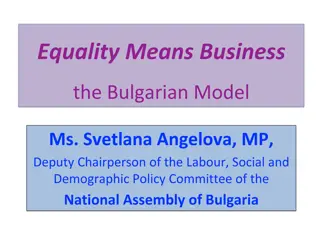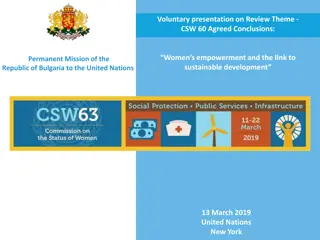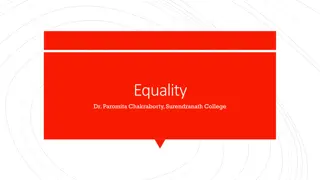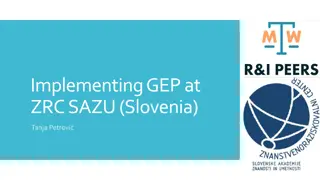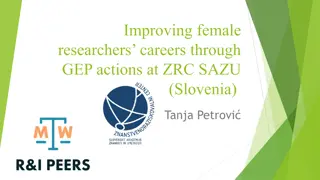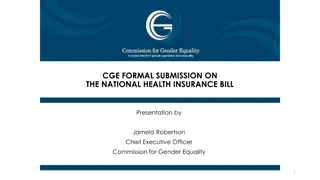Promoting Gender Equality in Trade: Turkey's Legal and Economic Perspectives
This project in Turkey focuses on enhancing gender equality in trade through legal and economic lenses. It aims to address gender gaps in foreign trade-oriented companies, improve working conditions for women, and influence national and firm-level policies for inclusiveness in trade. The project includes developing a survey to assess gender equality in workplaces, examining labor conditionality in trade agreements, and encouraging firms to adopt gender-sensitive workplace policies.
Download Presentation

Please find below an Image/Link to download the presentation.
The content on the website is provided AS IS for your information and personal use only. It may not be sold, licensed, or shared on other websites without obtaining consent from the author. Download presentation by click this link. If you encounter any issues during the download, it is possible that the publisher has removed the file from their server.
E N D
Presentation Transcript
Inclusive Trade in Turkey: Legal and Economic Perspectives on Labour and Gender Asst. Prof. P nar Art ran, WTO Chair Holder Prof. K bra Do an Yenisey Assoc. Prof. Yelda Y cel Asst. Prof. Cemil Ozan Soydemir
Roadmap Purpose / rationale of the project Work plan Expected outcomes
Purpose / Rationale Reflect upon discussions on women and trade that take place within the larger WTO context and draw conclusions on how to better achieve the inclusiveness in trade Examine the relationship between international trade orientation and gender equality at the firm level in Turkey Provide a new approach to analyze gender equality in firms by bringing together economic and international legal and human rights frameworks Contribute to gender equality in trade and employment policies at the national level, along with firms' business making
Purpose / Rationale Closer look at the relationship between international trade and gender equality in foreign trade- oriented companies. Medium-term output of the project is to reveal the gender gaps in the workplace. Decent employment environment and job quality as prerequisites of gender equality. Extension of the employment coverage to include a gender approach to employment and human resource policies.
Work Plan / Methodology Development of a survey to assess the working conditions. Survey to become a tool: to assess gender equality in workplaces in the external sector. portray difficulties and barriers women face and the opportunities to be enhanced in foreign trade-oriented firms. Annual repetition of the survey to reveal progress in these dimensions and encourage firms to improve their capacity to design gender-sensitive workplace policies. Examination of labour conditionality in trade agreements to be signed by Turkey and its implications for Turkish exporters and Turkey s trade and labour policies
Work Plan / Methodology Full implementation of the survey and data analysis is expected to last 15 months. However, due to limited scheme of the recent WCP Call For Proposals, WCP Team at Istanbul Bilgi University proposed a work plan that consists of activities to take place in seven months until the end of December 2021. From June to December 2021, Team members will prepare a survey and make the pilot testing thereof by the end of 2021.
3 pillars: Curriculum Development Certificate program on Inclusive Trade, Gender Equality and Labour Clauses Integrate modules in Istanbul Bilgi University Curricula WCP Team to offer an interdisciplinary elective course on trade, gender, organizational behaviour, law and economics to be included in the Full List of the entire University A Ph.D. student to join WCP Team to incorporate the project into the new courses
3 pillars: Research Literature review, theoretical framework, and hypotheses refinement Co-authored article on labour clauses in regional trade agreements and potential implications for Turkey and its exporters Survey on gender-equal workplaces (Survey development + pilot testing) Article to be submitted to an indexed academic journal in December 2021(Caveat: entire peer-review process and article acceptance likely to exceed project's preset deadline) Participation in the WTO Public Forum
3 pillars: Outreach Workshop on "International Trade and Gender Equality: How to Bring Together Theory and Practice (October 2021) A day workshop on "Inclusive Trade Agreements: Women and Labour" in cooperation with other academic institutions and NGOs (November 2021) Dissemination of the project outcomes via several media channels (Bilgi podcast and online academic seminars) (Fall
Expected Outcomes Research to highlight particular interactions of firms with different institutional structures that determine their approach to gender equality Export-oriented firms are projected to be more sensitive to equality, especially if their major int l partners are prone to gender equality. Import and domestic market-oriented firms are projected to lack external supervision and hence likelihood of worse indicators of gender equality. Engagement in trade networks may alleviate gender awareness in international trade firms Legal structures and international human rights covenants and agreements may affect firms' approach to gender equality.
Thank you Dr. P nar Art ran WTO Chair Director of the Research Center for International Trade Law and Arbitration, stanbul Bilgi University https://utitam-wcp.bilgi.edu.tr/en/
